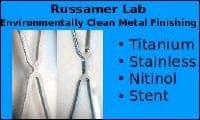
Curated with aloha by
Ted Mooney, P.E. RET

The authoritative public forum
for Metal Finishing 1989-2025

-----
Can an electroless plating bath be used to generate hydrogen for production of electricity
Q. What happens when we immerse a piece of iron metal into a solution containing dimethyl amine borane at high concentration, without adding a metal salt as in an electroless plating bath, and heating this solution? Does oxidation of this reducing agent occur with evolution of hydrogen as in an electroless plating bath or do we have to add nickel salt to evolve hydrogen? Can we consider this method a way of producing hydrogen?
thanks
electricity company - Cairo, Egypt
August 25, 2012
A. Below is the answer from our specialist:
This is a known decomposition reaction on the surface of Borane metals, especially iron group (iron, nickel, cobalt). You take dimetilaminboran, i.e., the connection of HB(CH3)2* NH3. In this process, only one hydrogen falls from the bonding B-H. We suggest to use the amminboran VN3NH3, which produces three times more hydrogen. But in all cases, unfortunately, the ammonia
⇦ this on
eBay or
Amazon [affil links] molecule is not destroyed, and the hydrogen is released only from the Boron atom.

Anna Berkovich
Russamer Lab
Pittsburgh, Pennsylvania

September 6, 2012
Q. what happen when we immerse iron rod in ammonia borane solution?does hydrogen evolves or we need to add iron complex to this solution instead of iron metal for regeneration of hydrogen? does edta chelated fe++ effective complex?
thanks
- Cairo, Egypt
September 17, 2012
Q. Does polarisation of iron metal occur when we insert this piece of metal in a solution containing sodium borohydride and sodium chloride salt? As you know hydrogen will evolve due to activated hydrolysis of sodium borohydride and it will react with oxygen dissolved in the water of solution and reduce it to OH- ions. Does this polarize the piece of metal and give it a negative charge ?
Ahmed Abo Awf- Cairo, Egypt
February 25, 2013
A. Hi Ahmed. Sorry, I have no experience in that area and cannot answer your question. But I do have decades of experience in administering this public forum and can tell you that you will get much more enthusiastic participation and much better responses to your inquiries if you explain your own situation and actual problem rather than casting things in the abstract :-)
Luck and Regards,

Ted Mooney, P.E.
Striving to live Aloha
finishing.com - Pine Beach, New Jersey
February 25, 2013
Q. Inplating process the anode is positively charged, while the cathode is negatively charged. In electroless bath, like electroless nickel bath, does the work piece immersed in the bath become positively charged or negatively charged during operating? In other words does the work piece polarise relatively to the solution?
Ahmad Abo Awf- Cairo, Egypt
March 20, 2013
A. Hi Ahmad. I don't think so. I believe the plating bath has both the positively charged nickel ions and the catalytically activated reducing agent which provides the necessary reducing power.
Regards,

Ted Mooney, P.E.
Striving to live Aloha
finishing.com - Pine Beach, New Jersey
March 20, 2013
Q, A, or Comment on THIS thread -or- Start a NEW Thread